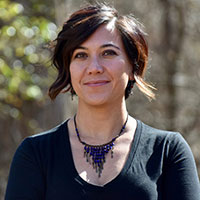Palmquist responds to COVID-19, advocates and supports best practices for infant and young child feeding during pandemic
August 25, 2020

Dr. Aunchalee Palmquist
Aunchalee Palmquist, PhD, assistant professor of maternal and child health at the UNC Gillings School of Global Public Health, studies infant and young child feeding (IYCF) in emergencies and other situations of extreme adversity. When the COVID-19 pandemic began, her understanding of the information environment and needs allowed her to contribute expert guidance about best practices for perinatal mothers, infants and children where it is needed most. Palmquist works closely with Catherine Sullivan, director of the Carolina Global Breastfeeding Institute (CGBI), to align programmatic and advocacy activities towards a shared vision for optimal early and young child feeding and birth practices.
Palmquist leads CGBI’s Lactation and Infant Feeding in Emergencies (L.I.F.E.)™ Initiative, which she established after Hurricane Florence to meet a crucial need; the initiative provides a central hub for research, technical assistance, health communications, policy, advocacy and training for IYCF in emergencies. With this infrastructure in place and with the assistance of the implementation scientists on the CGBI team, she was able to quickly respond to the pandemic.
“When the pandemic hit, we were in a position to ensure that health facilities had the information they needed to train staff, provide care and develop policies,” said Palmquist. “We adapted this resource to provide high-quality information on the emerging science and guidance for infant feeding and COVID-19 to lactation supporters who work in clinical settings, community-based settings and early child educational settings.”
The L.I.F.E.™ hub resources were initially created in response to needs identified by ENRICH Carolinas health facilities that, with support from CGBI and The Duke Endowment, have committed to providing a holistic model of community breastfeeding promotion and support and evidence-based maternity care in the Carolinas and beyond. Current work focuses on ensuring all materials are available in Spanish and other non-English languages in the communities that the CGBI serves, including the Ready, Set, Baby Live virtual breastfeeding classes for COVID-19 produced in partnership with the N.C. Special Supplemental Nutrition Program for Women, Infants, and Children and ENRICH Carolinas.
Dr. Palmquist is also spearheading efforts to strengthen the implementation of recommended infant feeding practices and COVID-19 through the new United States Breastfeeding Committee (USBC) COVID-19 IYCF Constellation. As part of this group, she engaged in conversations with the U.S. Centers for Disease Control and Prevention (CDC), raising concerns about the organization’s early guidance that called for separation of mothers from their newborn infants in confirmed or suspected cases of COVID-19. Early iterations of the CDC’s guidance conflicted with World Health Organization (WHO) recommendations, which rejected separation in many cases because its negative effects on feeding outweighed associated risks. Further, disruptions to optimal breastfeeding support practices are consistently found to have disparate effects on marginalized populations, especially people of color, so the policy of separation was likely to contribute to the pandemic’s inequitable effects.
“The CDC, as well as the American Academy of Pediatrics, have since updated their guidance so that it now aligns with the WHO guidance and the best available science,” said Palmquist. “We just released the COVID-19 IYCF Constellation Joint Statement, which outlines our collective commitment to racial equity, human rights protection during birth and lactation, and national public health advocacy, to ensure access to sound nutrition and food security in the first thousand days of life.”
Palmquist is also a training specialist under the CGBI’s Reclaiming, Improving, and Sustaining Equity: Lactation Training Model, which seeks structural changes that will advance opportunities for people of color to become board certified lactation professionals. This effort endeavors to counteract effects of racism that disrupt access to respectful high-quality care, contribute to obstetric violence and lead to lower breastfeeding rates among Black women.
Palmquist also represents the CGBI on the WHO/United Nations Children’s Fund Global Breastfeeding Collective, the Emergency Nutrition Network Infant Feeding in Emergencies Core Group, the CORE group Humanitarian-Development Task Force and the United States Breastfeeding Committee.
Her personal scholarship and practice focus on health equity in the perinatal and postpartum period, and her work engages and supports communities in the United States and internationally facing structural violence, racism, humanitarian crises and other situations of extreme adversity.
Her aim is for IYCF guidance to be incorporated into all aspects of emergency response.
“CGBI’s role as co-steward of the USBC Constellation has been pivotal in amplifying this advocacy at a national level, but there is more work to be done at home here in North Carolina,” said Palmquist. “I would like to see the state be a national leader in how to strengthen support for IYCF in emergencies, from communities to a state-level response.”
Contact the UNC Gillings School of Global Public Health communications team at sphcomms@unc.edu.
